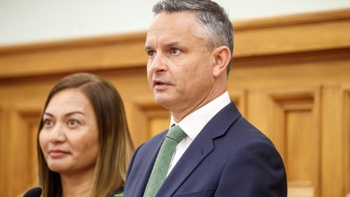
A “burned-out” Tauranga secondary teacher who has been in the profession for six years says she is “trying to make a difference” but needs better pay and more resources to do her job properly.
Jessie Fauntleroy, originally from Australia, is one of about 800 secondary and area school teachers in the Western Bay of Plenty set to strike again this week after Post Primary Teachers’ Association (PPTA) members voted on Friday for more industrial action, including a one-day national strike on Wednesday.
It follows New Zealand’s largest teachers’ strike on March 15, where roughly 50,000 early childhood workers, primary and secondary school teachers and principals protested, calling for higher staffing numbers, more school funding and better pay.
Many secondary schools in the Bay of Plenty will be closed, but some were offering supervision for junior students.
The Ministry of Education said it was “seeking facilitated bargaining as a matter of urgency”.
/cloudfront-ap-southeast-2.images.arcpublishing.com/nzme/Z7TRUR343VFYZJTMWKLEASLRDQ.jpg)
Tauranga secondary school teacher Jessie Fauntleroy.
Fauntleroy has been a secondary school teacher in Tauranga for just over one year. She previously taught at schools in Australia and England.
As a sixth-year teacher and Year 9 dean, Fauntleroy said the pay was “just not sustainable”. In her role, she earned about NZD$10,000 less than a first-year teacher in Australia, she said.
“A first-year teacher in Australia gets paid AU$75,000 ... I am still below $70,000 [NZD].”
Under the current exchange rate, AU$75,000 is NZD$80,500.
“The pay discrepancy is so bad.”
Fauntleroy said she was also earning NZD$30,000 less than when she was working as a fourth-year teacher and dean in England.
Until recently, Fauntleroy and her partner - who was in the police force - had not been able to “even think about buying a house”, she said.
“We got told mid-last year our salaries just aren’t enough to support mortgage repayments - even though we eat at home most of the time, we don’t buy new clothes and we don’t have any streaming services.”
The pair wanted to make a difference in their community, but Fauntleroy said it was difficult “when we can’t start our lives”.
Fauntleroy said she was also striking because there needed to be “more resourcing” to help staff deal with students’ “complex” needs.
“The problems these children have with mental health, and family issues - they bring so much more to school, and there is a lot more pressure on us to manage all of these things as well.
“We are feeling super burned-out and a little bit powerless. We are trying to make a difference, but there just aren’t enough resources there.”
While disruption caused by the strike was “so hard” for families, she said the school community had been very supportive so far.
“They know we are doing it for the right reasons.”
PPTA Western Bay of Plenty regional chairwoman Julie Secker told the Bay of Plenty Times about 800 secondary and area school teachers in the region would take strike action.
Secker said “none of us want to strike”, but it was important to take action to “stand up for what we believe is right”.
“This needs to happen. We all love being in our classrooms and with our students, but we want to be supported by the Ministry of Education so we can do our job properly,” she said.
Members wanted a pay offer to match the rate of inflation, which would help retain and attract teachers to the profession, she said.
She was disappointed there had been “very little movement” on negotiations around the pay.
“If we can’t attract good teachers to the job and we don’t have enough teachers - then we are under pressure. The roll-on effect is negative on the students.”
In addition to tomorrow’s strike, the PPTA planned to roster different year levels of students to be at home on various days over four weeks.
Rolling strikes would be held in the third week of Term 2, when teachers would strike on different days in different regions.
From next term, members would also not attend meetings outside of school hours.
Ministry of Education general manager employment relations Mark Williamson said: “we are seeking facilitated bargaining as a matter of urgency, in the interests of concluding negotiations and returning to uninterrupted learning in the classroom”.
Williamson said as well as an offer on improving conditions, secondary teachers were offered salary increases of $4000 from the start of the collective agreement and $2000 in the second year.
That offer was rejected and the Ministry had since been “actively engaged” in detailed negotiations, he said.
“We progressed to mediated bargaining in an effort to reach agreement, but this has not resulted in a settlement.”
Williamson said the only way forward was facilitated bargaining through the Employment Relations Authority which provided an “independent view of the issues to support resolution of the dispute”.
The Ministry of Education also provided information about teacher’s salaries.
It said the average remuneration for secondary teachers, all inclusive, was $92,713 and the $4000 increase from December would have brought the top rate to $94,000 - an increase of 16.7 per cent compared to 2019. CPI increased in that time by 15.2 per cent, he said.
The information said teachers’ salaries varied depending on their qualifications, experience and responsibilities.
”We would normally expect someone in their sixth year of teaching who had a teacher’s qualification and an undergraduate qualification in a specialist subject (by far the majority of secondary teachers) to be paid $75,190 per annum.”
Take your Radio, Podcasts and Music with you









